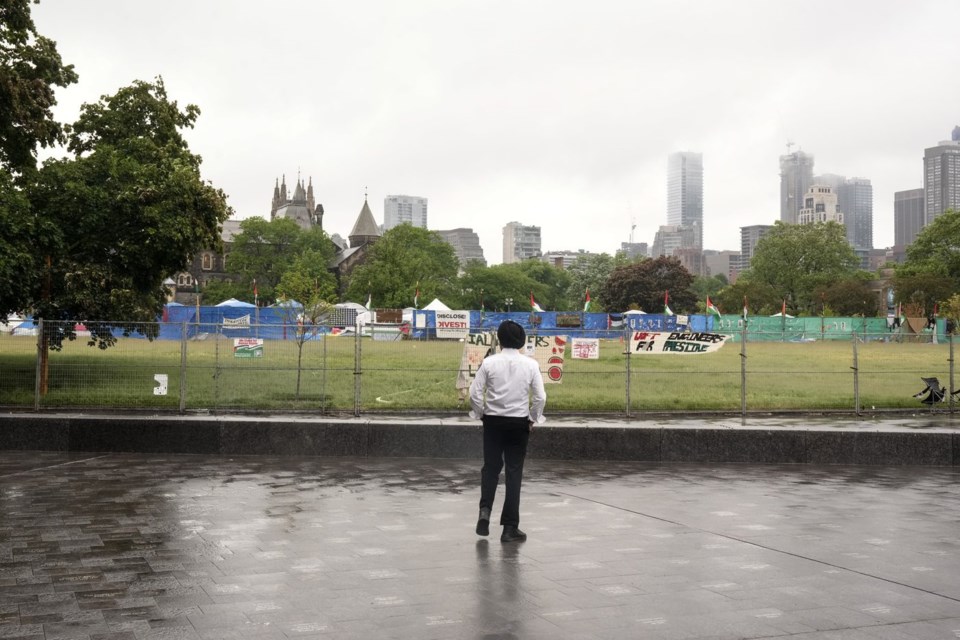TORONTO — A pro-Palestinian protest encampment has taken over University of Toronto property without permission, infringing on others' free speech rights and making members of the community feel unsafe or unwelcome, lawyers for the school argued before an Ontario court Wednesday.
The encampment set up more than a month ago in the area known as King's College Circle also breaches university policies, lawyer Monique Jilesen said as she laid out the university's arguments in seeking an injunction to clear the encampment.
She told the court protesters have set up a gate to enter the space and are screening people before allowing them inside, meaning those who don't agree with the protest or its guidelines aren't able to access the area as they could before.
Jilesen suggested the process of vetting people who come into the space "increases confrontations" at the encampment.
Protesters describe the encampment as peaceful and diverse, and while it may be that way for them, that is not everyone's experience, particularly those outside the encampment, the lawyer said.
She pointed to several reports of hateful speech or intimidation, including one immediately outside the encampment in which people shouted expletives at a man and told him to go back to his country, and another in which a sign with an antisemitic slogan was found.
While it's not known whether the people behind those reported incidents were part of the protest, “this was not seen before the encampment,” Jilesen said.
It's also "pure speculation" that those engaging in harmful behaviour are not part of the encampment, since the organizers themselves can't clearly identify everyone involved, she said.
The university's reputation has suffered because people are associating it with the messages and actions of the encampment, she said. Jilesen acknowledged U of T's reputation may also take a hit if it succeeds in dismantling the encampment, but argued that is the university's decision to make.
The university turned to the court late last month after protesters ignored its deadline to dismantle the encampment.
The encampment was set up on May 2 and participants have said they won't leave until the school agrees to disclose investments in companies profiting from Israel's offensive in Gaza and cut ties with Israeli academic institutions.
The school is asking the court to authorize police action to remove protesters who refuse to leave, arguing the encampment is causing irreparable harm to the institution.
It is also seeking to prevent protesters from blocking access to university property or setting up fences, tents or other structures on campus.
In their court filings, the protesters say the school's claims of irreparable harm are "grounded in troubling mischaracterizations" of the encampment as violent and antisemitic.
While the university has included examples of antisemitic incidents in its filings, the students say the evidence regarding these incidents is hearsay and cannot be put to the test, nor has the school proven any connection to the encampment or its participants.
They also argue that clearing the encampment would violate their protected rights to free expression and peaceful assembly.
"Inconveniences to the university and discomfort by those who disagree do not outweigh these vital rights," they argue in the documents.
Representatives of the encampment are expected to make their arguments before the court Thursday.
A number of groups — including the Canadian Association of University Teachers, the Canadian Federation of Students-Ontario and a number of Jewish advocacy groups — have been granted intervener status in the case.
The university had sought the injunction on an urgent basis because the encampment is near Convocation Hall, where more than 30 graduation ceremonies were scheduled to take place from early this month to Friday. The court hearings are taking take place after most of the ceremonies have happened, with no major disruptions.
Outside the court process, the two sides have been meeting to negotiate a possible agreement, but the talks appeared to reach an impasse last week when the university said the protesters had rejected its latest offer. The university said it was open to continuing the negotiations "when there are productive reasons for doing so."
Representatives of the encampment, meanwhile, said the university had not been negotiating in good faith, noting the school's president had yet to participate or meet any of the protesters.
On Wednesday, a spokesperson for the encampment said the group presented an offer to the school on Tuesday but it was rejected.
The university said it received the offer on Tuesday afternoon and sent a counteroffer, to which it had not received a response by Wednesday afternoon.
This report by The Canadian Press was first published June 19, 2024.
Paola Loriggio, The Canadian Press

